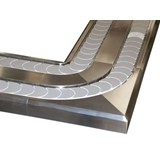Professor Louis de Koker, from the University's School of Law who is an expert on money laundering and financial crime, said rising concern among international tax authorities about the use of software and devices that altered cash register records had prompted the Organisation of Economic Cooperation and Development to issue a special report on their use last month.
"Traditionally small businesses tended to evade tax simply by not recording certain cash transactions or by running two cash registers or sets of books – one for the taxman and one for their unofficial l transactions," Professor de Koker explained.
"In Australia this skimming activity cost one Australian restaurant owner who got caught, $8.4 million in tax and penalties.
"Now, technology has enabled skimming to become automated and to spread to non-cash transactions."
"Sale suppression software called 'phantomware' can be installed in the Point of Sale system and used to erase transactions from the electronic records of cash registers. External programs known as 'zappers' can be carried on a USB device or CD.
Professor de Koker said 'zappers' are used on cash registers and removed after the records were altered. This makes it very difficult to detect the use of the software.
"These programs are typically launched by the business owner after the close of business to remove the records of a percentage of the business that was done," de Koker said.
"The business owner doesn’t declare the 'zapped' business income to the taxman and also keeps any sales tax paid by their customers. Clients are none the wiser because the business was done using the cash register.
"The truth will emerge in the unlikely event that someone with access to the altered records also has copies of original slips issued to the clients."
Professor de Koker said the software could enable a branch manager to hide the theft of cash from the business.
"A franchisee may also use it to cheat the franchisor out of a share of royalties levied on the turnover of the business," he said.
"A business owner with a struggling business may also inflate records to off-load the business on an unsuspecting purchaser.
"Or at its worst it can even be used to inflate sales where the business is used as a money laundering or terrorist financing front.
"In short, it undermines the integrity and reliability of the business and information records of small and especially family-owned businesses."
Professor de Koker said while it was early days in Australia and there was little public evidence that cash register manipulation software had spread to Australia, the issue had not been thoroughly investigated.
"Experiences in other OECD countries indicate it is only a matter of time," he said.
"The abuses are set to increase, especially as more handy apps and programs turn ordinary mobile phones and tablets into cash registers and card-readers.
"In Canada for instance sales suppression in Canadian restaurants is estimated to cost CAD$ 2.4 billion in one year.
"Since the OECD’s Task Force on Tax Crimes and Other Crimes (TFTC) began to work on and to spread awareness of this phenomenon a number of countries (including Sweden, Ireland, Norway and the United States) have tested their retail sector and found significant problems.
"In the past two years 10 US states moved quickly to put in place legislation to help tackle such abuse."
"Tackling this issue aggressively is seen by a number of countries as an important ingredient of a strategy to reduce their overall tax gap. Australia should seriously consider appropriate preventative measures to prevent tampering with point of sale records by insiders."



-160x160-state_article-rel-cat.png)




